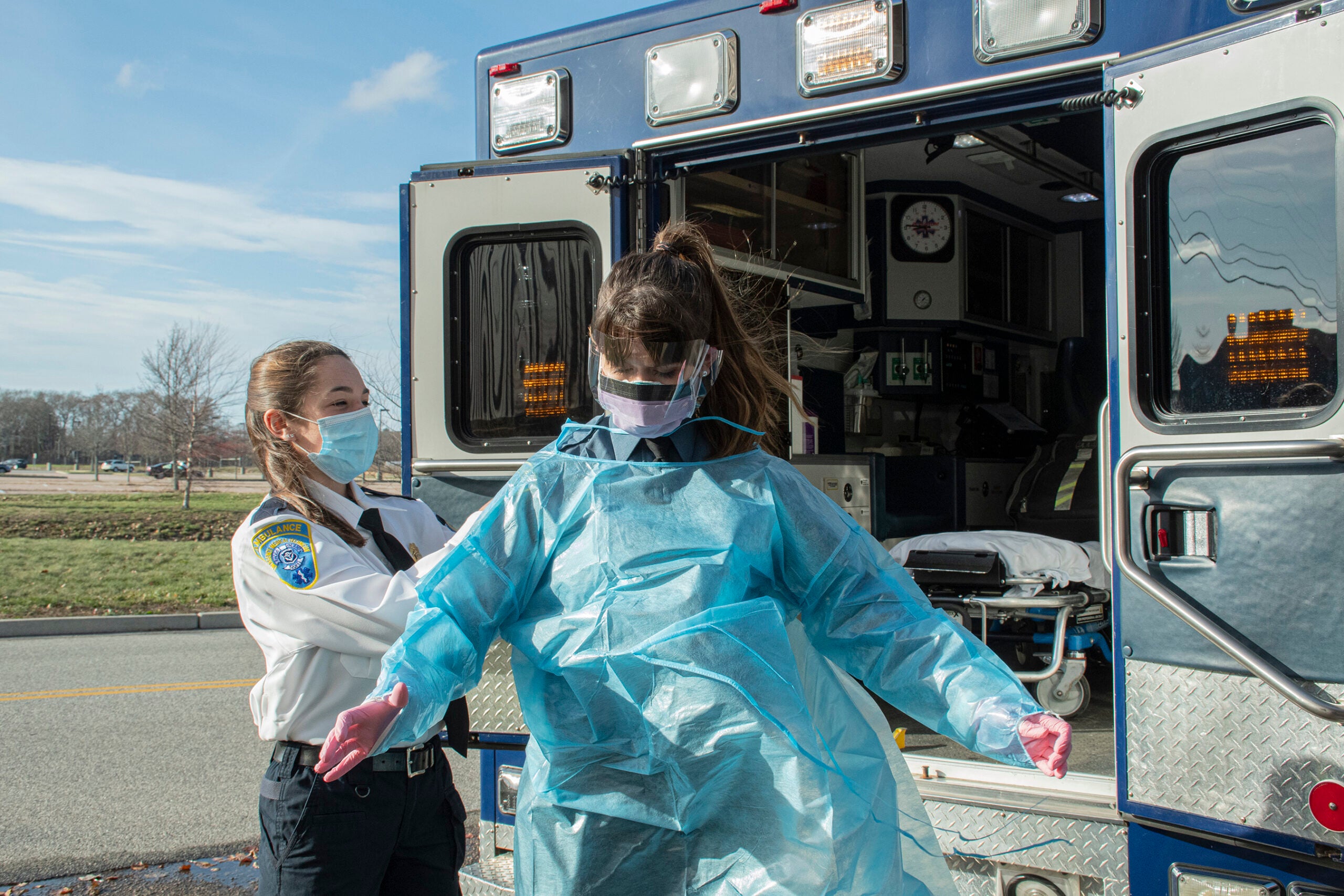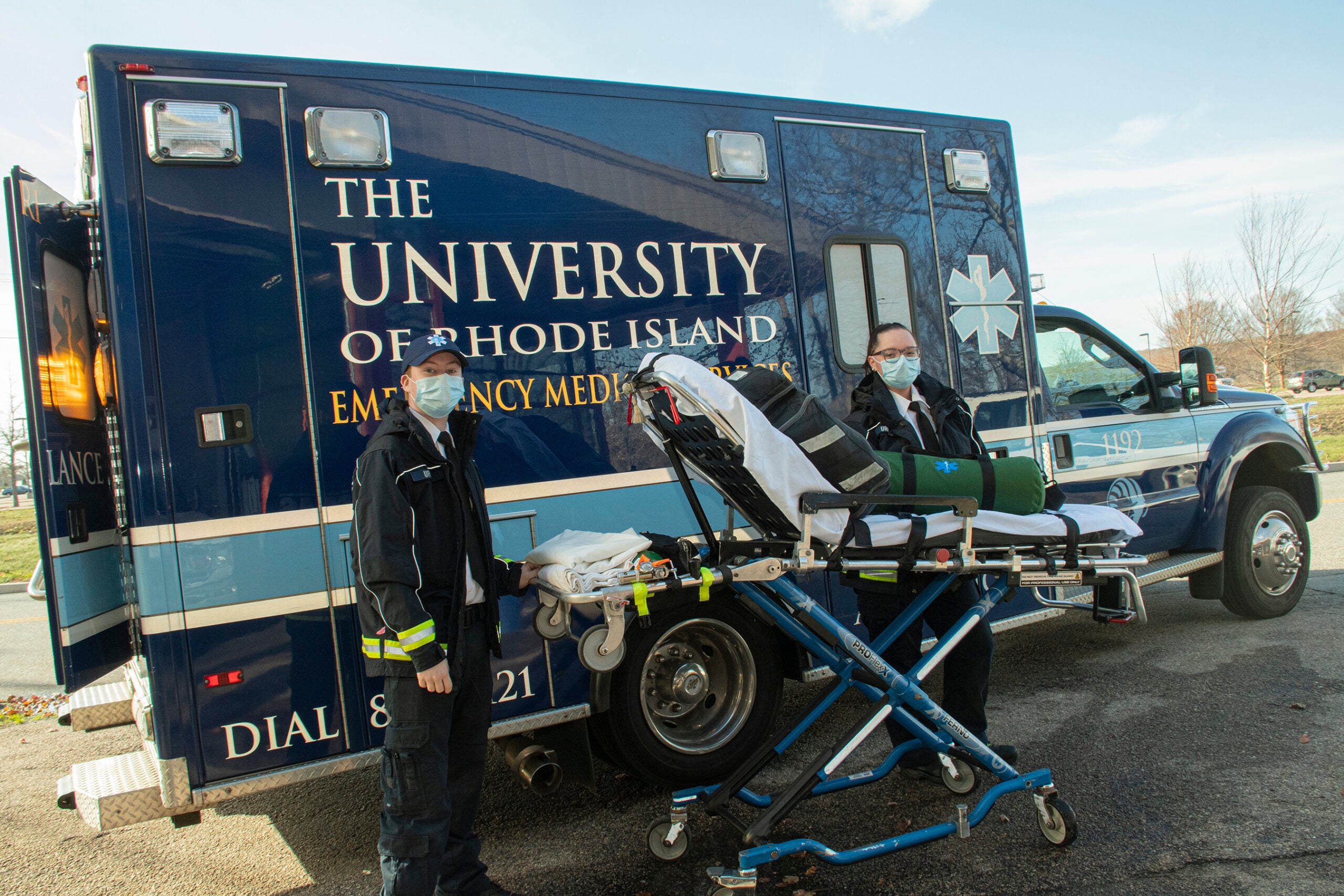KINGSTON, R.I. — Dec. 9, 2020 — University of Rhode Island’s Emergency Medical Services has dealt with almost every medical emergency you could imagine, from heart attacks to car accidents and from the flu to sports injuries.
However, the 85 student volunteers who are the backbone of the service never expected they would be dealing with a worldwide pandemic in their undergraduate years. Even so, as one of the oldest collegiate emergency medical services in the country, which provides on-site emergency medical service and ambulance transport to area hospitals, the team wants the URI community to know that it has the skills needed to serve the University’s emergency medical needs throughout this demanding time.
“Our student corpsmen are extremely driven and dedicated people who thrive on challenges,” said Cmdr. Robert Hart, a lieutenant with the Warwick Police Department who graduated from the University in 2004. “As scary as this pandemic is, they view it as a challenge to tackle and overcome. When we recruit new corpsmen, we look for traits that show us that they will be fighters and will embrace the challenges of public safety work. This way, when something as prolonged as the COVID-19 pandemic or something as acute as an immediate life-threatening situation arises, they can grasp the situation and handle it.”

The volunteers come from a wide variety of backgrounds and majors. For some students, their service with the corps may not directly relate to their intended career paths, but the volunteers nevertheless believe the skills they have gained will benefit them throughout the course of their careers and their lives. This year, their selflessness has reached a new level, as they put themselves in harm’s way.
According to Lt. Emma Ceres of Wilmington, Massachusetts and a graduate student studying developmental science who has been with URI’s EMS team for six years, “We are seeing numbers that are worrisome to everybody. We have seen that not everybody is entirely cooperative all the time with masks and distancing, which has a ripple effect and we see numbers go up. That’s frustrating, and puts everyone’s health at risk. Everybody on the team signs up for EMS and you understand that it comes with risks, but this year has posed a different risk that’s a little bit closer to home, so it’s been challenging to say the least.”
Despite the unique struggles this school year has presented, none of the program’s volunteers have left the corps due to COVID-19.
“URI EMS has been an instrumental part of the University’s COVID-19 plan,” said Ellen Reynolds, assistant vice president for Health and Wellness and director of URI Health Services. “The volunteers have responded to our call for assistance throughout the semester in many different ways, from staffing the move-in testing center at the Ryan Center in August to coordinating a schedule of drivers who seven days a week are transporting students to our off-campus isolation and quarantine space all while ensuring the ambulance is staffed and ready to handle medical emergencies on campus. The EMS team is a point of pride for URI, these first responders are always willing to serve the University and the community and this has been further exemplified during their COVID response.”
In addition to the typical medical calls to which URI EMS responds, it is also providing non-emergency transport for students who need to get to University-allocated isolation and quarantine locations.
The team follows closely the evolving COVID-19 guidelines of the State of Rhode Island, as well as University guidance and policies. As of now, the corps members are required to always wear a surgical mask.
But if a dispatcher learns that a patient has symptoms of the virus, EMS members upgrade their gear to N-95 masks and goggles. If the patient has received a positive COVID-19 test, the team members wear gowns, face shields, and N-95 masks.
When asked why students volunteer so much of their time Hart responded, “Some students volunteer at EMS for clinical hours, but many of them grew up volunteering or have an interest in emergency medicine. We have students who are studying kinesiology, psychology, marine affairs, and some who are pre-med. Some want to join the medical field, some just love pre-hospital emergency medicine and being in the streets, so to speak.”
URI EMS responds to all calls from the URI community, with the most common being sports injuries, mental health issues, alcohol-related concerns, cardiac-related incidents, and car crashes. Additionally, the teams respond to requests for mutual aid made by area towns that need assistance.
Only the commander, the vice commander, two captains and a student administrative assistant receive small stipends for their service.
For Michael Brennan, a senior studying cell and molecular biology from Mannasquan, New Jersey, joining URI EMS his freshman year was a career move, one that he could see benefitting him as he prepared for medical school. While he still feels the decision has already benefited him educationally, volunteering has come to mean more to him than simply being a resume-booster.
“I really appreciate that EMS has created a little family. There’s a strong sense of camaraderie fostered by the fact that we see a lot and we do a lot together. It’s also the perfect experience for myself; being able to learn how to talk to patients and treat them on a basic level. Working with other people who have been doing it longer has prepared me perfectly for medical school.”
According to Ceres, “If you never need us we are glad about that, but if you do, we are right there. We are absolutely essential to the University, and in COVID times it has become really clear that we are needed here.
“I find that not many people know that we exist at URI and that agencies like this exist, period,” added Ceres. “Students think that they will call upon the town municipal agency [when they dial 911], but we do it all. We love doing this. Everybody is here because they enjoy helping people.”
Not many students realize their EMS team exists on campus and that serving as a corpsmen is a unique experience.
“Not many students can say that in between classes they walk down to EMS and respond to two 911 calls and then go back to class like nothing happened,” added Ceres. “URI EMS is a unique operation because we are students ourselves, but we get to respond to the calls of our fellow students on their worst day.”
Despite additional challenges this school year, it’s clear that the members of URI’s EMS team are no less passionate and devoted to their service to the University. According to Brennen, “the majority of the people we see and treat are URI students and staff. I love the school, so it feels great to give back.”
In addition to providing emergency medical aid to URI and the larger community, the corps is also the official medical provider of WaterFire, the popular festival based in Providence, and staffs local events such as the Blessing of the Fleet road race in Narragansett, as well as all of the University’s musical and sporting events.
“We are volunteers here for the community 24/7, 365 days a year, providing 911 emergency medical services to our campus partners and our larger community,” added Hart. “This is not a full-time job for any of us, but it’s a passion for all of us.”
In the event of an emergency, please call 911.
You can learn more about URI’s Emergency Medical Services team by visiting its website or Facebook page.
Lauren Poirier, an intern in the Marketing and Communications Department at URI and public relations and English major, wrote this press release.

